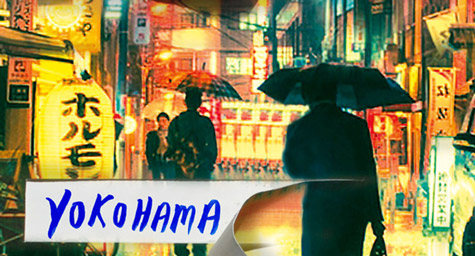
Read Part 3 of Nicolás Obregón's 3-part series, “The Birth of Blue Light Yokohama,” and make sure to sign in and comment below for a chance to win a copy of his exciting debut!
Some six years ago, I boarded a flight from London Heathrow bound for Japan. As I sat there, I could barely contain my excitement. I was in my mid-20s, working for a travel magazine, and was being sent on assignment to Japan—my dream destination.
By 2014, things were different. I was no longer in my mid-20s. I was no longer working as a travel writer. It was less of a struggle to contain my excitement about things. After a decade of travelling the world and living in various flat-shares around London, I was in a soul-destroying job and back living at my mother’s. The job (writing for a legal publisher) was only meant to be temporary, something to keep my head above water while I figured out what I wanted to do. But four years later, I was still there, by then a deputy editor.
The conditions were awful, almost laughably so, but the pay was decent enough, and I did—in a very distant way—get to work with letters for a living. As someone who had always dreamed of being a writer, there was a miniscule pleasure in editing the dreary copy of badly-remunerated twenty-somethings who would leave the company within six months. Or at least that’s what I told myself.
Deep down, I knew I was stuck in a rut. I wasn’t writing anything in my spare time, but I excused myself by reasoning that there just weren’t enough hours in the day. The most I’d managed that was anywhere close to decent was a short story about a sea blob that claimed to be the Second Coming of Christ. It wasn’t much of a C.V.
As the London winter deepened, on more or less a whim, I booked a flight to Japan with my girlfriend. My 30th birthday was fast approaching and—keen to avoid the party organization palaver—I thought it would be nice to spend it instead on bullet trains retracing my old route from my travel writing days. I promised myself I would send off “Danny and the Sea Blob” to a writing competition when I got back.
Landing in Tokyo, my spirits immediately lifted. There was something at once familiar but new about this city—a city of 37 million people and infinite possibilities cached between never-ending skyscrapers, a forest of concrete, and a river of glass. In magazines, it would often be the thronging neon of Shinjuku you would see, or some cherry blossom Kyoto scene perhaps. Of course, that’s all there—but what I liked most about Tokyo was actually its slices of the everyday playing out on toy-sized streets: gingko trees and bakeries, cyclists and pedestrians weaving around each other, drink machines in the tiny gaps between buildings selling BOSS Coffee.
After a week of long city walks and gorging on sashimi, it was on to Osaka, where the Yodo River lit up gold at night with lanterns set up in tree branches to accentuate the beauty of the cherry blossoms. Families, friends, and lovers ambled along the illuminated banks—laughing, chatting, snacking on fried octopus, and drinking cheap cans of beer.
Next up, we travelled to Kyushu, Japan’s southernmost tip. The word “Nagasaki” to many outsiders immediately conjures images of atomic devastation, and it is a place with an undeniably fascinating history, though one that reaches far beyond WWII. But it is also, for my money, one of the most beautiful cities in the world—all cobblestones and hidden shrines set on green, mountainous terrain around a glittering bay.
From there, it was a bullet train to Hiroshima, another city marked by tragic history. If you ever get the chance to go, I can’t recommend the Peace Museum enough—a horrifying but humbling experience. But Hiroshima also has less dramatic landmarks, such as the Zoom Zoom Stadium—home of the Carp, where you can take in a baseball match while eating fried seafood in a plastic fireman’s helmet—or the beautiful River Ōta.
The river is a pleasure to walk along, not least because it will lead you to the best okonomiyaki in the world: Lopez—a dinky, low-key place run by a charismatic Guatemalan who is considered the local okonomiyaki master. If you can get him talking, he has a hell of a life story (he speaks fluent English, Spanish and Japanese).
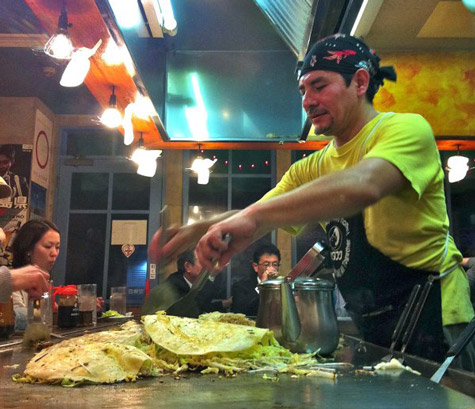
And it was from here on the night of the April 16, 2014, with a bellyful of beer and okonomiyaki, that we were returning to our hotel room. My girlfriend fell asleep, but my body was wired. I stared at the “no smoking” sign above the bed. Maybe it was the heavy meal. Or maybe it was the knowledge the holiday was winding down. The next day we were due to head to Kyoto. From there it would be Tokyo, and, of course, Tokyo meant London was on the horizon.
It meant I would be forced to consider what was waiting for me back home, the life I was going to lead. People did things in their thirties. What would I do? Would I take chances? Would I be someone different? Or would I still be poring over dreary legal copy at 40? At 50? Would I die pondering a semi-colon applied to a Paraguayan’s litigation practice? And if so, was that really that big of a tragedy? Most people on the planet did a job they didn’t particularly like, and that was in places of privilege, let alone the rest. One failed writer that didn’t write all that much wasn’t exactly anything to cry about.
Giving up on sleep, I switched on the TV and left it on an infomercial channel I couldn’t understand. Spotting an old newspaper on the desk, I flipped through. A few pages in, I stopped dead. Once again, I was looking at a family. A very ordinary-looking family sitting on some stone steps, most likely on a day out. The same family I had read about four years before. The same family whose house I had journeyed to in the dead of night just to look. The same family that had been murdered by an unknown assailant on the December 30, 2000.
Maybe this is selective thinking, but in that moment it was as if the Miyazawa family were saying, here we are again. Now, I don’t believe in fate, but the fact that I had made a throwaway pilgrimage to their house four years ago now somehow felt like fate. Seeing their faces again ripped me back into the past, where they would always be.
My life had changed since I’d last seen them. I was different. I was older. They were not. They had not changed. I could travel. Walk along rivers. Eat okonomiyaki. Listen to stories told by charming Guatemalans. They were a memory, consigned to a memorable date, kept alive day-to-day only by relatives and policemen forever hoping for a breakthrough in the case.
As I’ve said before, I had always been fascinated by Japan. My earliest experiences of storytelling came from Japan. Perhaps for that reason, I had always toyed with the idea of writing about a Japanese detective. I would write little short stories, but my detective would always come out too tough and too cool that I ended up boring myself.
In Part 2, I spoke about the 246,000 policemen who investigated the Miyazawa case. Now, in my hotel room, the newspaper in my hands, I saw a photograph of these policemen. They were dressed in black, respectfully lined up outside the Miyazawa’s house, bowing before it on the anniversary of the murders. Then, I peered closer. It was grainy, but it looked like the policeman on the end was upset. Genuinely upset. I wondered why he cared so much. Had something happened in his life that made this a trigger?
I think in that moment I realized I wanted to write a novel inspired by what had happened to the Miyazawas. And a detective on the trail of a family killer appeared in my mind. I pictured him treading quietly and carefully through a fictionalized Miyazawa house, running his eyes over strange details. This detective looked like the crying policeman in the photo. He didn’t make wisecracks, and he wasn’t tough. He was someone vulnerable; he was someone with his own tragedies; he was someone full of sorrow but dedicated to fighting the battles of the dead.
And so Inspector Kosuke Iwata was born.
In my hotel room, Ayumi Ishida was singing “Blue Light Yokohama”—a limited-time offer for a CD box set. I wrote down the words Blue Light Yokohama novel? It didn’t mean anything to me back then, but it struck me that as a working title it wasn’t half bad.
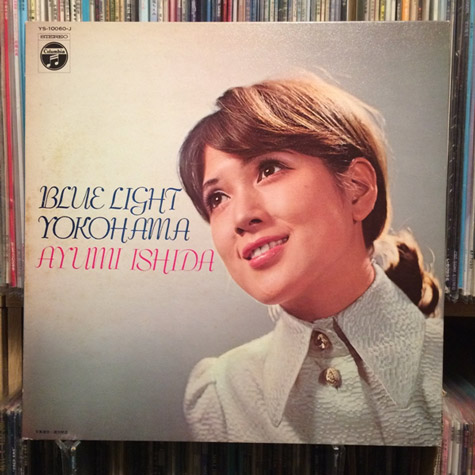
Over the next few days, I plotted out a crime novel that would respect the conventions of the genre but, at its heart, would be about facelessness. About people in pain. And it was as a door opened for me. I’d never written with such drive, such clarity. Ideas and prose had never flowed in this way before. I can say with all honesty that it was during those few days walking around Kyoto with a notepad—snatching moments in hotel rooms and on train journeys, piecing together what would eventually become Blue Light Yokohama—that I realized writing wasn’t something that I quite enjoyed. It was, in fact, something that absolutely burned within me.
By the time I returned to London a week later, I knew who my detective was, who my villain was, and more or less the rough plot. I started to order crime novels by the ton, research the Japanese penal code, and write questionnaires for my characters. Then, back at work one day on my lunch break, I paused. I told myself I knew relatively little about Japan. I certainly didn’t speak the language. And I knew next to nothing about the Tokyo Metropolitan Police.
Just from a practical standpoint, was this really a novel I could write?
Beyond that, and perhaps most concerning of all, I wondered about the ethics of taking inspiration from real-life tragedy and turning it into fiction. In the end, I told myself that I could put in the hard yards when it came to research, and—as for using real life to create fiction—it wasn’t as if anyone was going to read the thing.
And besides, I wasn’t the first person to use real life to tell a good story. There is, of course, a rich tradition when it comes to true crime blurring the lines between reality and story—Capote’s In Cold Blood the benchmark. Lately, I also much enjoyed Macrae Burnet’s His Bloody Project. More journalistic in style, two of my favorite books are People Who Eat Darkness by Richard Lloyd Parry, a mesmerizing account of the Lucie Blackman murder, and the exceptional Somebody’s Husband, Somebody’s Son by Gordon Burn, a deeply penetrating insight into the Yorkshire Ripper.
But I wasn’t trying to tell the Miyazawa’s story, nor anybody else’s—at least not from the living world. I simply wanted to use the atrocity that befell them as the basis for a novel that explored facelessness. Vulnerability. Solitude. I can’t pretend that I wrote Blue Light Yokohama altruistically; it’s a fictional novel for which I was paid. I want people to like it, and I want people to buy it. Nor can I pretend that this novel is a thinly-disguised attempt at keeping the memory of the Miyazawas alive. In truth, Blue Light Yokohama isn’t even about them.
But, it’s also true that it would never have been written without them. If I’d never come across those newspapers, I never would have met Inspector Iwata. I’d probably still be biting my tongue in that dingy London office, trying to flog a short story about a sea blob in my spare time. The Miyazawa family gave me a clarity and an intensity I’d never experienced before. I’m sure this sounds deeply selfish or crass, but they helped me to realize that I am a writer. And I won’t ever forget them.
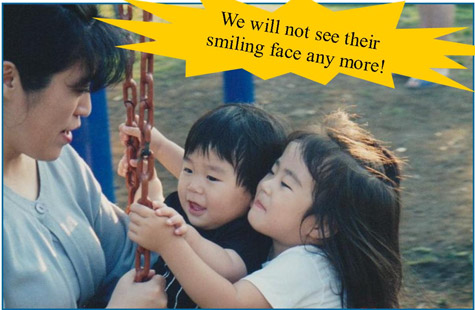
Almost three years on from that Hiroshima hotel room, and Blue Light Yokohama just hit the shops. I pinch myself every day. In the past twelve months, I’ve been hard at work on a second Inspector Iwata novel. My life has moved forwards. But I still look at photographs of the family from time to time. I keep up with the latest sleuth theories online regarding the killer. And I don’t give up hope that he’ll be apprehended one day.
As for the Miyazawa family, I hope they’re resting in peace, if there is such a thing. I just hope they can forgive me the intrusion.
Read an excerpt from Blue Light Yokohama!
Comment below for a chance to win a copy of Blue Light Yokohama by Nicolás Obregón!
To enter, make sure you're a registered member of the site and simply leave a comment below.
TIP: Since only comments from registered users will be tabulated, if your user name appears in red above your comment—STOP—go log in, then try commenting again. If your user name appears in black above your comment, You’re In!
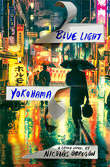 Blue Light Yokohama Comment Sweepstakes: NO PURCHASE NECESSARY TO ENTER OR WIN. A purchase does not improve your chances of winning. Sweepstakes open to legal residents of 50 United States, D.C., and Canada (excluding Quebec), who are 18 years or older as of the date of entry. To enter, complete the “Post a Comment” entry at https://www.criminalelement.com/blogs/2017/03/the-birth-of-blue-light-yokohama-a-family-murder-becomes-fiction-part-3 beginning at 4:45 p.m. Eastern Time (ET) March 9, 2017. Sweepstakes ends 4:44 p.m. ET March 21, 2017. Void outside the United States and Canada and where prohibited by law. Please see full details and official rules here. Sponsor: Macmillan, 175 Fifth Ave., New York, NY 10010.
Blue Light Yokohama Comment Sweepstakes: NO PURCHASE NECESSARY TO ENTER OR WIN. A purchase does not improve your chances of winning. Sweepstakes open to legal residents of 50 United States, D.C., and Canada (excluding Quebec), who are 18 years or older as of the date of entry. To enter, complete the “Post a Comment” entry at https://www.criminalelement.com/blogs/2017/03/the-birth-of-blue-light-yokohama-a-family-murder-becomes-fiction-part-3 beginning at 4:45 p.m. Eastern Time (ET) March 9, 2017. Sweepstakes ends 4:44 p.m. ET March 21, 2017. Void outside the United States and Canada and where prohibited by law. Please see full details and official rules here. Sponsor: Macmillan, 175 Fifth Ave., New York, NY 10010.
To learn more or order a copy of Blue Light Yokohama, visit:
opens in a new window![]() opens in a new window
opens in a new window![]()
Nicolás Obregón is a British-Spanish dual national and grew up between London and Madrid. He has worked as a steward at sports stadiums, an editor in legal publishing and a travel writer, falling in love with Japan while on assignment for a magazine. Blue Light Yokohama is his first novel.

Hello. I am in.
Sounds fascinating! And I love learning about Japan!
looks interesting
I’ve visited Japan and love the country, the people, and thei culture!
Looks great!
I’d love to win.
Yes, please enter me in this sweepstakes.
Thanks —
Just returned from a visit to Japan – love to win!
I would love to read the book.
I would love to read the book.
Can’t wait to read!
I would love to discover The Birth of Blue Light! And after my curiosity is satiated I will make sure my brother reads it on his next trip to the Far East.
love a good mystery…this one sounds appealing
Sounds interesting
can’t wait to read the rest! thanks
can’t wait to read the rest! thanks
I would love ot learn more about Japan
Looks interesting .
A most fascinating feature and a captivating book which I would enjoy. Thanks.
The interview sure peaked my interest in Japan and the story. Thanks for this chance to read this debut novel
The interview sure peaked my interest in Japan and the story. Thanks for this chance to read this debut novel
Fascinating! I can’t wait to read the book.
Sometimes a story stirs interest and magic happens! I hope to read your book!
Interesting…love to read!
Interesting…love to read!
A story of a part of Japan! Yes!
Mmmm! Sushi seasoned with a little mystery.
Sounds like an interesting read. Thanks for the opportunity to win a copy.
Anything that has the words “sea blob” in it gets my attention.
Would love to win!
love to win a copy thanks
All things Japanese fascinate me! I would love to read this.
interesting
This sounds like an interesting series. I look forward to it.
Great story! I’d love to travel to Japan under any circumstances and Blue Light Yokohama sounds like a trip for my mind at least. Thanks for the chance to win a copy.
Inspiration is as inspiration does. Looks like it turned into a really interesting novel!
Fun teaser. I want to check this out.
what a wonderful sweepstake price
Sea blob…Fukishima?
Count me in, please!
Reading what you wrote about Japan and the book, makes me want to go there myself. My husband loved his trip and visit to Japan so very much. I’ll look for the two previous books in the series.
I look forward to reading this.
I’d like to read this book. Wish me luck!
fantastic!
fantastic!
Would love to read this book, thank you for the chance!
domo arigato
looking forward to reading this!
I love learning what inspires the author to write the book!
Sounds intriguing.
I always enjoy a peak into the mind of an author.
Looks like a great series that I would enjoy very much
I want this book, hope I get it 🙂
This looks like an awesome book. I love reading books set in Japan,
SexyPG89 ufazeed เกมสล็อต แทงบอลออนไลน์ แตกง่าย แตกหนัก แจกจริง เว็บตรงมาแรง แห่งปี 2023
SexyPG1688 สล็อตpx เว็บออนไลน์ที่ให้ได้มากกว่า